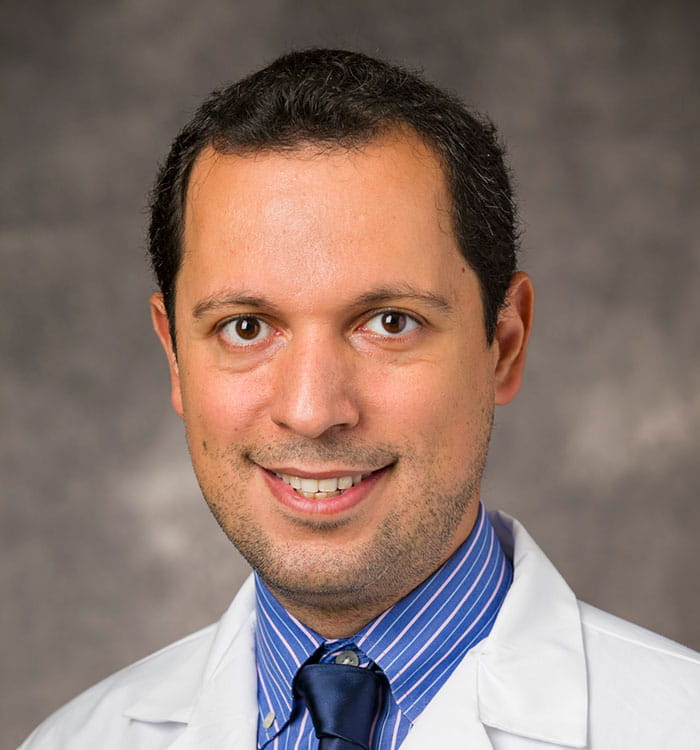Innovation in Medical Education at University Hospitals Cleveland Medical Center
July 06, 2022
Innovations in Pulmonary & Sleep Medicine | Summer 2022
The COVID-19 pandemic clearly demonstrated there’s more to medicine than just delivering clinical care. Providers need diverse leadership skills, which often take a back seat in formal medical training programs. Furthermore, the burden on clinicians who take care of COVID patients in the Intensive Care Unit takes an emotional toll.
Maroun Matta, MD, Director of the Fellowship Program in Pulmonary, Critical Care and Sleep Medicine, University Hospitals Cleveland Medical Center, received grants from the University Hospitals Graduate Medical Office to develop several new medical education programs.
 Maroun Matta, MD
Maroun Matta, MD“Medical education is one of my main areas of interest,” he says. “Being innovative in this area is a top priority for me and is supported by the division.”
Leadership training
“UH is committed to taking a multidisciplinary approach to patient care in the ICU,” says Dr. Matta. “However, it’s complicated, requiring multiple avenues of service delivery and collaboration with nursing, anesthesia, respiratory therapists, medical residents and interns. There’s a lot of need for leadership skills, which are typically lacking in medical training.”
Dr. Matta launched a formal training program to address some of the most relevant topics in pulmonology and critical care, for both members of his division and others who provide critical care medicine to patients.
“To develop our curriculum, we collaborated with the Weatherhead School of Management at Case Western Reserve University,” he says. “Instead of just training one or two people, which is the usual approach, we took a teach-the-trainer approach, selecting a faculty member most interested in a specific topic (such as women in leadership, or resilience) and training them so they could bring what they learned back to all the critical care fellows. Our goal is to create leaders in the field of pulmonology and critical care medicine. So far, many fellows have participated, and the feedback has been overwhelmingly positive.”
Dealing with grief in the ICU
“Death is a part of working in the ICU, but dealing with death from an emotional and personal perspective can lead to burnout in care providers,” Dr. Matta says. “This was especially true during COVID. Our goal was to increase wellness among staff and reduce burnout, so we developed what we call Mortality Rounds.”
Modeled after hospital multidisciplinary rounds, Mortality Rounds provide a biweekly format for physicians and other providers to discuss the humanitarian aspects of dealing with patients’ deaths.
“We start by reading the names of the people who died and taking a moment of silence to honor them,” says Dr. Matta. “Then, over a meal, we have an open conversation about how the losses affect us. We share memories or funny stories about our patients. It’s a way to share our humanity, feelings and emotions. We also share best practices about how we personally cope with difficult emotions. Finally, we send a card to patients’ families on behalf of the team.
“This multidisciplinary approach has not been done before. It’s not just residents; it’s the nurses, respiratory therapists and medical assistants. We also collaborate with the palliative care team, as they have expertise in this area. The feedback from participants has been so overwhelming, we plan to continue Mortality Rounds even after our grant expires.”
Impact of virtual interviews on placement in Pulmonary and Critical Care
Prior to the COVID pandemic, there was a structured process, a match system, in place for pulmonology and critical care physicians to apply for fellowships. This process included applications, in-person interviews and an objective ranking system to best match fellow candidates with fellowship programs.
Dr. Matta is curious about the impact of in-person compared to virtual interviews, and how this might evolve once the pandemic is behind us. There are pros of virtual, including not having the costs and scheduling disruptions of travel. However, Dr. Matta wondered if there are also shortcomings that need to be addressed.
“UH is providing some of the data behind these changes,” he says. “We want to know how it affects placements. Does it disfavor minorities? Is it equitable? Do clinicians still apply to the same programs they would have if doing in-person interviews? These are important questions. So far, there is no straightforward answer, but I hope this becomes clearer in the days to come.”
Dr. Matta says medical education is an exciting field to be part of and to do research work in.
“There are a lot of questions in the field that are unanswered, and there’s always room to innovate.”
For more information about these programs, contact Dr. Matta at 216-844-8500.
Contributing Expert:
Maroun Matta, MD
Director, Fellowship Program in Pulmonary, Critical Care and Sleep Medicine
University Hospitals Cleveland Medical Center
Assistant Professor Medicine
Case Western Reserve University School of Medicine


